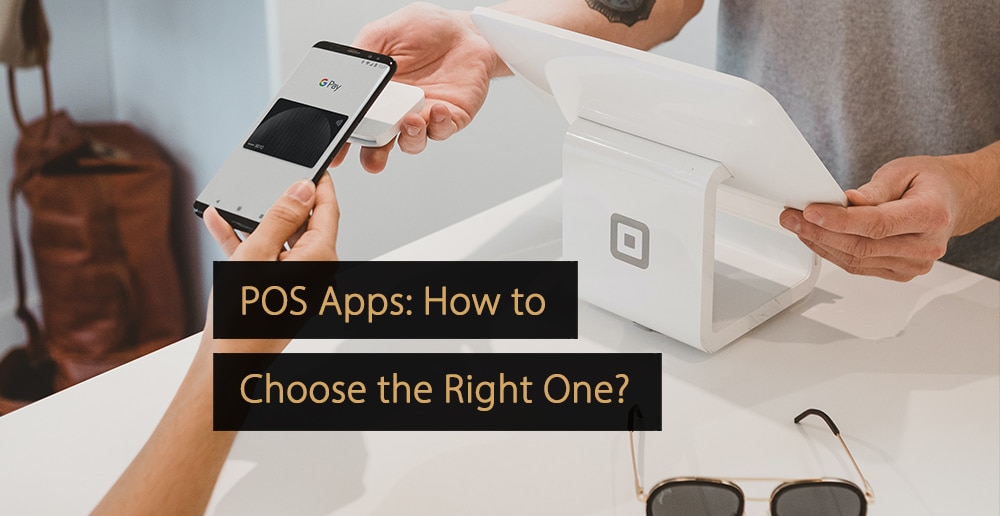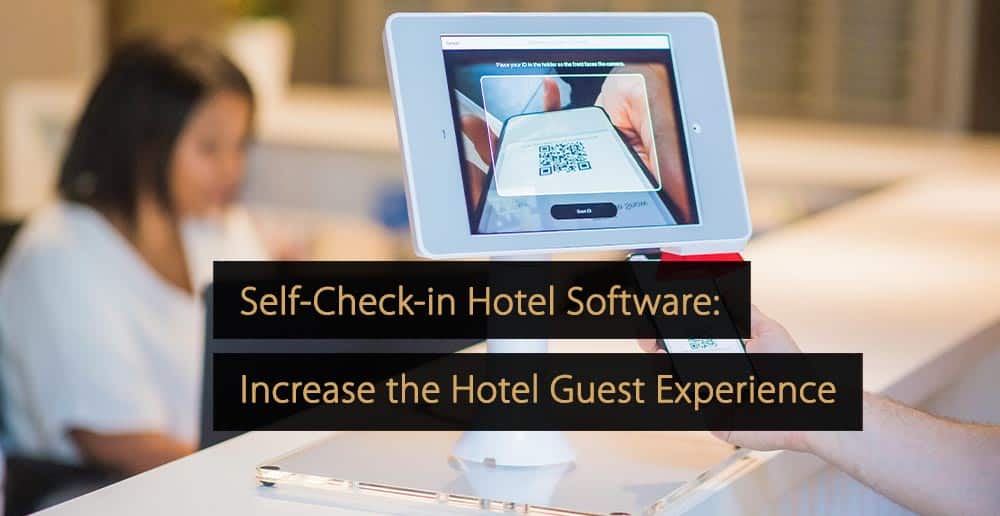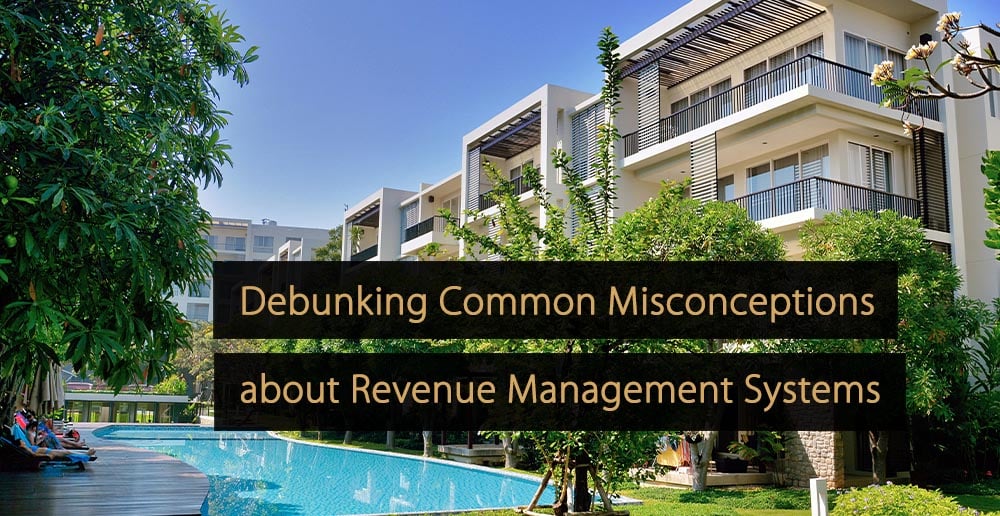A good POS app can be invaluable for hospitality employees because it can streamline processes, enhance the customer experience, and improve your company’s ability to track key performance indicators. However, following a sensible process for finding the right app is crucial. In this article, you will learn more about how POS apps work, how you can choose the right one, and why this decision is so important in the first place.
Table of Contents:
- What are POS Apps?
- Why Choosing the Right POS App is Important
- What Are Important Aspects to Assess When Choosing a POS App?
- Consider Future Growth When Choosing a POS App for Your Business
- POS Apps and Other Hotel Software Solutions
- Importance of POS Apps in the Hospitality Industry
- Benefits of POS Apps for Hotels
- Reporting Features Within a POS App
- POS App: Trends for the Restaurant Industry
- Maximize POS Apps Within Hospitality Businesses
What are POS Apps?
A POS app is the name given to an application used to control a point-of-sale system. The app will allow employees of hospitality businesses to process card, cash, and mobile wallet payments. Still, it is also important to understand that the uses of a POS system go far beyond simple payment processing alone.
A POS app can automatically and continually update sales data and other important information in real-time. This helps businesses keep their performance metrics up-to-date and can inform everything from sales performance monitoring and employee performance monitoring to revenue management.
The use of a POS app on a portable device, such as an iPad or tablet, also allows those devices to process payments, and this has the potential to enhance the customer experience by providing greater flexibility.
Why Choosing the Right POS App is Important
Selecting the right POS app is vital, but it is also important to understand that this will mean different things to different businesses. For example, if you are starting a new venture, the best app will likely be fairly simple, user-friendly, and designed to make your business more efficient.
By contrast, if you are upgrading an existing app, you will want a solution with a better range of features, so you will need to consider your current app’s limitations. Furthermore, the type of business you run can influence your decision, as the best hotel app may not necessarily be the best solution for a restaurant or a bar.
What Are Important Aspects to Assess When Choosing a POS App?
When selecting the best POS app for their business, there are several important aspects that those in hospitality management will need to assess or analyze. Some of the most significant of these are explored below:
Hardware and Software Budget
One of the most crucial aspects to consider when exploring POS apps is the budget you have available for both the hardware and software. However, this can be more complicated than initially seem because POS systems have vastly different structures or billing models, including upfront payments and monthly subscriptions.
That said, the POS app’s costs form only one part of the equation. You will also need to consider the hardware used in the system, including card readers, printers, cash registers, tablets, mobile phones, computers, and any other device used to process payments or store data.
On top of this, you may need to think about some of the associated or hidden costs, such as the cost of storing data, or the costs associated with accessing updates. Select software and hardware that does what you need, which provides scope for upgrading your system in the future, and which is within the budget you established.
POS App Features
Next, you will need to carefully consider the features on offer from the different POS app solutions on the market and compare and contrast these with the features that are most important to you. In particular, you may wish to focus on the following app features, whether they are present, and how advanced they are.
1. Food Service & Restaurant Features
For parts of the hospitality industry focused on food and beverage service, such as restaurants, finding a POS app that offers relevant features can be important. However, even within this sector, requirements can vary substantially, so some apps specifically focus on restaurants, bakeries, or bars.
Some apps target specific types of restaurants, such as fast food, pizza delivery, and so on. Specific features that may be relevant to you include menu creation, food ordering, online ordering, bill splitting options, restaurant layout features, food inventory features, and various communication tools.
2. Tools for Inventory Management
A key feature provided by high-quality POS apps is the ability to track inventory so that you know how much of a particular product you have left or how many rooms are available at any given time in businesses like hotels. This information can be updated automatically as sales are made, saving time and improving accuracy.
Some of the advanced features available here include stock alerts, informing you when inventory reaches a certain level, and automatic re-ordering, which can help avoid situations where you run out of a product.
3. Customer Data & Marketing
Many of the best POS apps will also include features based on customer data and marketing. This may include, for instance, customer relationship management tools, allowing you to access information about the products specific customers purchased, their chosen payment methods, the demographics that make up your customer base, etc.
As data becomes more complete, it can also be used for marketing purposes, informing you about your customer’s preferences and habits and allowing you to send marketing messages. Another aspect, which combines elements of customer data and marketing, is creating and managing a customer rewards or loyalty program.
4. Reporting & Analytics Options
For those involved with hospitality, another important feature to be aware of in a POS restaurant, bar, nightclub, or hotel app is the ability to access reporting and analytics options. This is possible because the POS system is integrated with other tools related to data collection, storage, and management.
As a result, you can potentially use your POS app to analyze sales-related information, access customer information, track other important data, and then analyze all of this to spot patterns and make forecasts. The insights gathered can also be presented in several formats, which is ideal for reporting to stakeholders.
Ultimately, reporting and analytics tools within POS apps enhance your understanding of your business, its performance, customers, and their behaviors and habits. Using this to your advantage, you can alter business processes and practices to enhance the customer experience and optimize finances.
5. Internet Connectivity
Finally, it is worth considering internet connectivity when evaluating POS apps and their features. This will also require you to think about your current situation. For instance, do you have reliable and continuous Wi-Fi access? If not, you may need to consider a solution providing sufficient support during offline periods.
There may be options that can assist with patchy connections, such as using an on-site or lite server, which can enhance the reliability of your connection. This may be a more expensive route than finding an offline app, but it does provide the benefit of allowing continuous, 24/7 access to data that is stored and shared via the cloud.
Integrating Your POS App with Other Software
Once you have explored the range of features available in the different POS apps on the market, you should consider integration more deeply. After all, you will need your chosen app to be as compatible as possible with the other software you are using and your existing business processes and operations.
In particular, it is sensible to look for integration options with marketing, CRM, accounting, and hotel software, as this can help save time and improve cross-departmental collaboration.
It could be worthwhile for restaurants to integrate their POS app with an existing online ordering system or reservation system so that the data can be shared between these systems seamlessly. Meanwhile, where reporting features are present, you may wish for the files to be compatible with your current apps.
Video: Restaurant Management – What Does POS Integration for Restaurant Software Mean?
Support and Training
Finally, those involved in hotel and restaurant management must think carefully about the support and training issues. Regarding support, this is likely to be an ongoing consideration, and you will need to factor in everything from help with the initial setup to assistance with technical issues.
This means exploring the level of support provided alongside the different POS apps and the associated services. You should also look into what the costs are likely to be and whether support is in-person or remote.
Alongside this issue, you should also consider training costs, the amount of training that is going to be required to bring staff up to speed, and whether or not you are going to need to bring in experts to provide this training. Costs in this area are likely to correlate with how advanced your chosen POS app is.
Consider Future Growth When Choosing a POS App for Your Business
For those involved in hotel management and other aspects of hospitality, the concept of growth is important. Businesses do not stand still, and in an ideal situation, your business will attract more customers over time, leading to increased revenue and opportunities for further growth.
With this in mind, businesses need to keep one eye on the future when selecting the right POS apps. While you may have some specific needs now, you should also consider your needs in a year, three years, five years, and beyond. You will also need to research options for upgrading in the future and assess how often new versions or updates are released. This will then help to ensure your investment is worthwhile in the long term.
POS Apps and Other Hotel Software Solutions
The right POS app is just one part of acquiring the best hotel software solutions. Other tools to optimize performance include a hotel channel manager, which will allow you to manage different distribution channels, a revenue management system, and a mobile check-in app.
Check out “Software Tips for the Hotel & Hospitality Industry” to access various articles centered around software solutions, their benefits, how to choose them, and how to get the most from them.
Selecting the right POS app is vital, and doing so will require you to consider a range of different factors, including the features on offer, your budget, future growth potential, and your other software solutions.
Importance of POS Apps in the Hospitality Industry
Having the right point of sale system can transform a hospitality business and help to take it to the next level, which is why it is so essential that senior figures in an organization understand the full range of features, how they can be leveraged, and the overall importance of POS apps.
To learn more about this topic, read “POS Systems: Overview and Importance in The Hospitality Industry”, where you can access the most critical information about POS systems, POS apps, and their true value.
Benefits of POS Apps for Hotels
The hotel industry is a crucial part of hospitality, but hotels also have specific concerns, needs, and expectations that are exclusive to them. With this in mind, POS apps can benefit hotels that may not necessarily be relevant to other businesses, or the benefits may be more significant within the hotel industry.
Read the article “6 Benefits of Point-of-Sale Software for Hotels” if you are interested in exploring a lot more about how POS apps and POS systems can assist hotel employees, management, and their customers.
Reporting Features Within a POS App
Many view POS apps as processing payments and collecting and managing important data. However, in reality, uses for these apps extend far further. In particular, the best apps will provide reporting features, which can be invaluable for employees who must report progress to senior staff and other stakeholders.
To learn more, read “A Deep-Dive into Reporting Features of POS Software for Hospitality”, where you can read about the key features and how they apply to restaurants, hotels, bars, and nightclubs.
POS App: Trends for the Restaurant Industry
In addition to understanding how to get the most from your POS app, you must be aware of the recent trends in using your POS system. This will help to ensure you do not miss out on potential uses and provide a competitive edge to rivals. Furthermore, you should also consider the future and trends that are likely as well.
Read the “Restaurant POS Systems: The Latest and Future Trends” article for more on the importance of keeping up with the latest trends, some examples, and exploring some trends that will shape the years ahead.
Maximise POS Apps Within Hospitality Businesses
The various features associated with POS apps provide businesses in the hospitality industry with great opportunities to maximize success. This can be achieved in several different ways, including upselling and cross-selling, customizing POS apps to suit your business needs, and training staff to use the systems to optimize customer satisfaction.
To learn more about how to get the most from your POS system and take full advantage of the various features, read through the “Maximise the Benefits of Point-of-Sale Systems in Hospitality” article.
More Tips to Grow Your Business
Revfine.com is the leading knowledge platform for the hospitality and travel industry. Professionals use our insights, strategies, and actionable tips to get inspired, optimize revenue, innovate processes, and improve customer experience.Explore expert advice on management, marketing, revenue management, operations, software, and technology in our dedicated Hotel, Hospitality, and Travel & Tourism categories.
This article is written by:
Hi, I am Martijn Barten, founder of Revfine.com. With 20 years of experience in the hospitality industry, I specialize in optimizing revenue by combining revenue management with marketing strategies. I have successfully developed, implemented, and managed revenue management and marketing strategies for individual properties and multi-property portfolios.









Leave A Comment